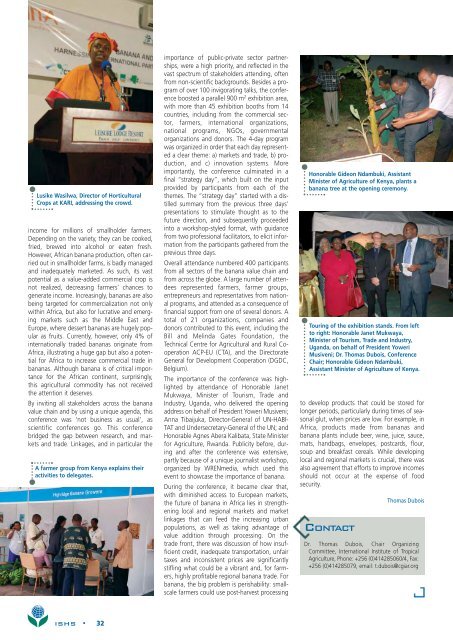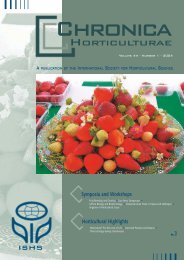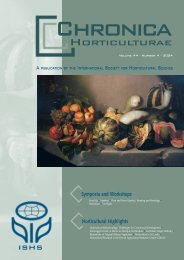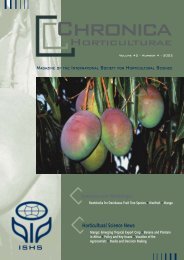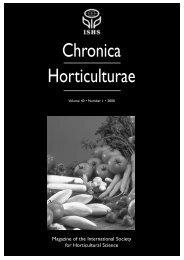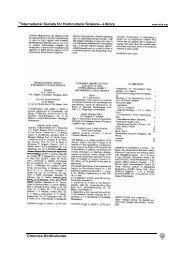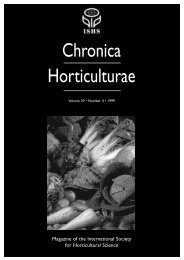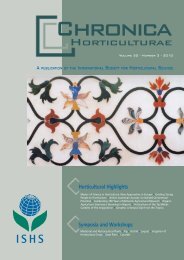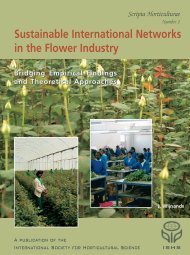Chronica Horticulturae volume 49 number 2 ... - Acta Horticulturae
Chronica Horticulturae volume 49 number 2 ... - Acta Horticulturae
Chronica Horticulturae volume 49 number 2 ... - Acta Horticulturae
You also want an ePaper? Increase the reach of your titles
YUMPU automatically turns print PDFs into web optimized ePapers that Google loves.
Lusike Wasilwa, Director of Horticultural<br />
Crops at KARI, addressing the crowd.<br />
income for millions of smallholder farmers.<br />
Depending on the variety, they can be cooked,<br />
fried, brewed into alcohol or eaten fresh.<br />
However, African banana production, often carried<br />
out in smallholder farms, is badly managed<br />
and inadequately marketed. As such, its vast<br />
potential as a value-added commercial crop is<br />
not realized, decreasing farmers’ chances to<br />
generate income. Increasingly, bananas are also<br />
being targeted for commercialization not only<br />
within Africa, but also for lucrative and emerging<br />
markets such as the Middle East and<br />
Europe, where dessert bananas are hugely popular<br />
as fruits. Currently, however, only 4% of<br />
internationally traded bananas originate from<br />
Africa, illustrating a huge gap but also a potential<br />
for Africa to increase commercial trade in<br />
bananas. Although banana is of critical importance<br />
for the African continent, surprisingly,<br />
this agricultural commodity has not received<br />
the attention it deserves.<br />
By inviting all stakeholders across the banana<br />
value chain and by using a unique agenda, this<br />
conference was ‘not business as usual’, as<br />
scientific conferences go. This conference<br />
bridged the gap between research, and markets<br />
and trade. Linkages, and in particular the<br />
A farmer group from Kenya explains their<br />
activities to delegates.<br />
importance of public-private sector partnerships,<br />
were a high priority, and reflected in the<br />
vast spectrum of stakeholders attending, often<br />
from non-scientific backgrounds. Besides a program<br />
of over 100 invigorating talks, the conference<br />
boosted a parallel 900 m 2 exhibition area,<br />
with more than 45 exhibition booths from 14<br />
countries, including from the commercial sector,<br />
farmers, international organizations,<br />
national programs, NGOs, governmental<br />
organizations and donors. The 4-day program<br />
was organized in order that each day represented<br />
a clear theme: a) markets and trade, b) production,<br />
and c) innovation systems. More<br />
importantly, the conference culminated in a<br />
final “strategy day”, which built on the input<br />
provided by participants from each of the<br />
themes. The “strategy day” started with a distilled<br />
summary from the previous three days’<br />
presentations to stimulate thought as to the<br />
future direction, and subsequently proceeded<br />
into a workshop-styled format, with guidance<br />
from two professional facilitators, to elicit information<br />
from the participants gathered from the<br />
previous three days.<br />
Overall attendance <strong>number</strong>ed 400 participants<br />
from all sectors of the banana value chain and<br />
from across the globe. A large <strong>number</strong> of attendees<br />
represented farmers, farmer groups,<br />
entrepreneurs and representatives from national<br />
programs, and attended as a consequence of<br />
financial support from one of several donors. A<br />
total of 21 organizations, companies and<br />
donors contributed to this event, including the<br />
Bill and Melinda Gates Foundation, the<br />
Technical Centre for Agricultural and Rural Cooperation<br />
ACP-EU (CTA), and the Directorate<br />
General for Development Cooperation (DGDC,<br />
Belgium).<br />
The importance of the conference was highlighted<br />
by attendance of Honorable Janet<br />
Mukwaya, Minister of Tourism, Trade and<br />
Industry, Uganda, who delivered the opening<br />
address on behalf of President Yoweri Musiveni;<br />
Anna Tibaijuka, Director-General of UN-HABI-<br />
TAT and Undersecretary-General of the UN; and<br />
Honorable Agnes Abera Kalibata, State Minister<br />
for Agriculture, Rwanda. Publicity before, during<br />
and after the conference was extensive,<br />
partly because of a unique journalist workshop,<br />
organized by WRENmedia, which used this<br />
event to showcase the importance of banana.<br />
During the conference, it became clear that,<br />
with diminished access to European markets,<br />
the future of banana in Africa lies in strengthening<br />
local and regional markets and market<br />
linkages that can feed the increasing urban<br />
populations, as well as taking advantage of<br />
value addition through processing. On the<br />
trade front, there was discussion of how insufficient<br />
credit, inadequate transportation, unfair<br />
taxes and inconsistent prices are significantly<br />
stifling what could be a vibrant and, for farmers,<br />
highly profitable regional banana trade. For<br />
banana, the big problem is perishability: smallscale<br />
farmers could use post-harvest processing<br />
Honorable Gideon Ndambuki, Assistant<br />
Minister of Agriculture of Kenya, plants a<br />
banana tree at the opening ceremony.<br />
Touring of the exhibition stands. From left<br />
to right: Honorable Janet Mukwaya,<br />
Minister of Tourism, Trade and Industry,<br />
Uganda, on behalf of President Yoweri<br />
Musiveni; Dr. Thomas Dubois, Conference<br />
Chair; Honorable Gideon Ndambuki,<br />
Assistant Minister of Agriculture of Kenya.<br />
to develop products that could be stored for<br />
longer periods, particularly during times of seasonal<br />
glut, when prices are low. For example, in<br />
Africa, products made from bananas and<br />
banana plants include beer, wine, juice, sauce,<br />
mats, handbags, envelopes, postcards, flour,<br />
soup and breakfast cereals. While developing<br />
local and regional markets is crucial, there was<br />
also agreement that efforts to improve incomes<br />
should not occur at the expense of food<br />
security.<br />
CONTACT<br />
Thomas Dubois<br />
Dr. Thomas Dubois, Chair Organizing<br />
Committee, International Institute of Tropical<br />
Agriculture, Phone: +256 (0)414285060/4, Fax:<br />
+256 (0)414285079, email: t.dubois@cgiar.org<br />
ISHS • 32


